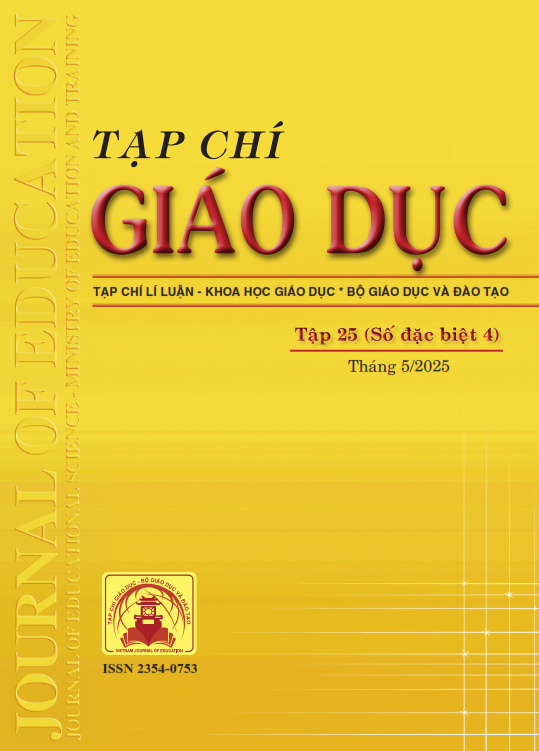Đề xuất quy trình ứng dụng trí tuệ nhân tạo tạo sinh để sáng tạo Boardgame giáo dục trong dạy học đọc hiểu văn bản truyện trinh thám ở trung học cơ sở
Tóm tắt
Teaching detective fiction reading comprehension is a newly introduced component in the 2018 Vietnamese Language Arts Curriculum. This study proposes and evaluates a process for applying generative artificial intelligence (GenAI) to design educational board games aimed at enhancing Grade 9 students' reading comprehension of detective fiction texts. The research methodology includes a theoretical overview of genre characteristics, educational board games, generative AI, and reading comprehension instruction, alongside pedagogical experimentation. A three-phase design process - Orientation & Training - Design - Feedback was developed and implemented to create the board game “The Great Detective”, using tools such as ChatGPT and Gemini, based on the short story “The Three Students”. Preliminary results indicate that this application significantly increases student engagement, fosters group interaction, and promotes the development of logical reasoning and genre-specific reading comprehension skills associated with detective fiction. The study affirms the feasibility and initial pedagogical effectiveness of applying generative AI in educational game design and offers practical recommendations for literature teachers seeking to innovate instructional methods.
Tài liệu tham khảo
Đoàn Thị Thanh Huyền (2024). Dạy học phân hóa và khả năng phát triển năng lực đọc hiểu cho học sinh trong môn Ngữ văn. Tạp chí Giáo dục, 24(12), 1-5.
Hồ Mạnh Tùng, Nguyễn Tô Hồng Kông, Hoàng Tùng Dương (2024). Ảnh hưởng của sản phẩm trí tuệ nhân tạo tạo sinh lên ngành báo chí và truyền thông: Hành vi và kinh tế báo chí. Tạp chí Thông tin và Truyền thông, 8, 80-89.
Nguyễn Thành Khánh (2016). Truyện trinh thám Việt Nam nửa đầu thế kỉ XX - Từ đặc trưng thể loại. Luận án tiến sĩ Ngữ văn, Trường Đại học Sư phạm Hà Nội.
Nguyễn Thị Hồng Ngân (2014). Phương pháp sử dụng trò chơi trong dạy học. Tạp chí Khoa học, Trường Đại học Sư phạm Thành phố Hồ Chí Minh, Số chuyên đề Khoa học Giáo dục tiểu học, 174-179.
Lâm Trần Sơn Ngọc Thiên Chương, Trương Hoàng Hân (2025). Ứng dụng ChatGPT vào xây dựng công cụ kiểm tra, đánh giá trong dạy học đọc hiểu văn bản “Đất rừng phương Nam” (Ngữ văn 10 - bộ Chân trời sáng tạo). Tạp chí Giáo dục, 25(số đặc biệt 1), 126-131.
U.S. Department of Education, Office of Educational Technology (2023). Artificial Intelligence and the Future of Teaching and Learning: Insights and Recommendations. https://www2.ed.gov/documents/ai-report/ai-report.pdf
Wolniak, R. (2017). The Design Thinking method and its stages. Systemy Wspomagania w Inżynierii Produkcji, 6(6), 247-255.
Đã Xuất bản
Cách trích dẫn
Số
Chuyên mục
Giấy phép

Tác phẩm này được cấp phép theo Ghi nhận tác giả của Creative Commons Giấy phép quốc tế 4.0 .












